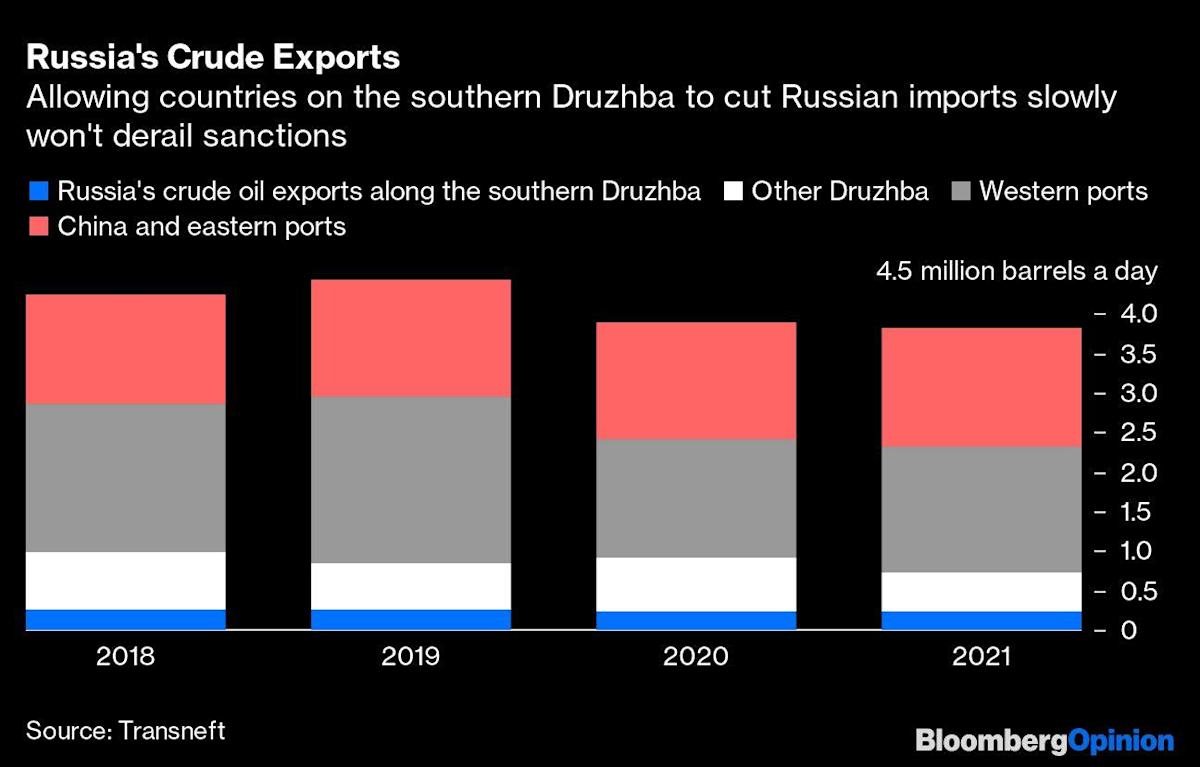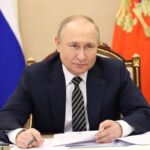
(Bloomberg) —
Most Read from Bloomberg
The European Union is set to propose delaying restrictions on Russian oil imports from a key pipeline in a bid to satisfy Hungarian objections and clinch an agreement on a stalled sanctions package, the bloc’s sixth, that would target Moscow for its war in Ukraine.
The EU’s executive arm is expected to circulate a revised proposal on Saturday that would temporarily spare shipments of oil through the giant Druzhba pipeline from a broader ban on oil deliveries, according to people familiar with the matter.
The proposal would initially phase out just seaborne shipments, later extending to the Druzhba deliveries once a technical solution is found that satisfies the energy needs of Hungary and other mostly landlocked nations, said the people, who asked not to be identified because the talks are private. Seaborne supplies account for about two-thirds of Russian oil imports.
EU ambassadors are scheduled to meet on Sunday when they could discuss the revised package, according to the people. Some member states are pushing to have an agreement before EU leaders meet in Brussels on Monday to discuss the war in Ukraine.
The compromise would buy time for the EU and Hungarian Prime Minister Viktor Orban to iron out technical details of phasing out pipeline supplies to his country, the people said. Hungary has been blocking plans to ban Russian oil for weeks.
The proposals are not finalized and could change before they are put forward and agreed by member states. The sanctions package requires the backing of all member states. Several nations had previously opposed distinguishing between seaborne and pipeline deliveries over concerns that such a split was unfair as it would disproportionately hit their supplies.
A European Commission official declined to comment on the details of the proposals, saying it’s continuing to support member states to find an agreement on the package.
The EU had previously proposed phasing out all Russian oil imports by early next year. Hungary and Slovakia would have been given until the end of 2024 to comply, while the Czech Republic would have been granted an exemption until June 2024. The countries are heavily reliant on Russian oil, but they account for a relatively small portion of the EU’s overall imports from Moscow.
Exempting pipeline oil from the measures — which Hungary had previously asked as a condition to back the package, along with more time and infrastructure investments — will dent the impact of the sanctions. Russia shipped about 720,000 barrels a day of crude to European refineries through its main pipeline to the region last year. That compares with seaborne volumes of 1.57 million barrels a day from its Baltic, Black Sea and Arctic ports.
However, the bulk of the pipeline deliveries are to Germany and Poland, which have signaled they will wean themselves off Russian supplies regardless of any EU action.
Insurance Ban
As part of the compromise, Bulgaria could be granted a longer transition period, two of the people said.
Greece and Cyprus are also demanding a longer transition on a proposed ban on providing services such as insurance needed to ship oil to third countries around the world, according to the people. Under the current proposal, that ban would kick in three months after the sanctions package is adopted.
That component of the original package had already been weakened after an earlier plan to ban tankers from shipping Russian oil to third countries was dropped earlier this month after Greece objected to that provision.
Cyprus is also pushing to limit proposed restrictions on Russian individuals and entities buying real estate in the EU and wants that measure to only apply to Russians who are based in Russia, the people said.
Other measures in the proposed EU sanctions package include:
• Cutting three more Russian banks off the international payments system SWIFT, including Russia’s largest lender Sberbank.
• Restricting Russian entities and individuals from purchasing property in the EU.
• Banning the ability to provide consulting services to Russian companies and trade in a number of chemicals.
• Sanctioning Alina Kabaeva, a former Olympic gymnast who is “closely associated” with President Vladimir Putin, according to an EU document; and Patriarch Kirill, who heads the Russian Orthodox Church and has been a vocal supporter of the Russian president and the war in Ukraine. Hungary, however, is opposed to sanctioning Kirill, the people said.
• Sanctioning dozens of military personnel, including those deemed responsible for reported war crimes in Bucha, as well as companies providing equipment, supplies and services to the Russian armed forces.
Most Read from Bloomberg Businessweek
©2022 Bloomberg L.P.




